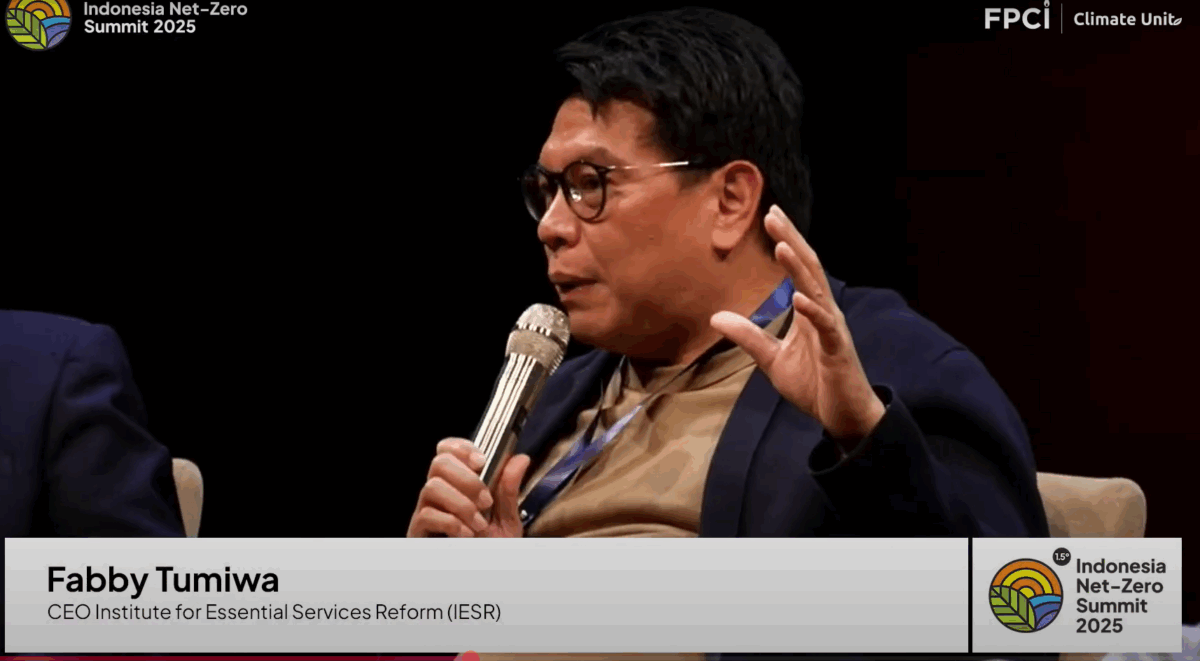Jakarta, July 26, 2025– “If Indonesia wants its economy to grow above six percent, then we must integrate emissions reduction efforts with the use of renewable energy. It’s as simple as that,” emphasized Fabby Tumiwa, Chief Executive Officer (CEO) of the Institute for Essential Services Reform (IESR), at the seminar “Finding Balance Between Resilience and Environmental Sustainability” organized by FPCI on July 26, 2025, in Jakarta.
Fabby cited a study by the Low Carbon Development Initiative (LCDI) of Bappenas, which found that to break free from the middle-income trap and become a developed country, Indonesia must pursue economic growth that goes hand in hand with environmental protection and the reduction of greenhouse gas emissions.
He challenged the notion that ambitious climate commitments in the Second Nationally Determined Contribution (SNDC) would hinder economic progress. On the contrary, Fabby stated that raising emission reduction targets is a necessary step toward building a greener, more sustainable economy, one driven by investments in low-carbon solutions.
“Air pollution in Jakarta leads to a decline in productivity and causes economic losses amounting to tens of trillions of rupiah each year. A study by Bappenas indicates that the impacts of climate change could reduce Indonesia’s economic income by approximately Rp550 trillion. This highlights the urgent need to direct investments toward greener sectors,” explained Fabby.
To attract more green investment, the government must build investor confidence by tackling corruption, ensuring policy certainty, and demonstrating the ability to supply renewable energy, now a crucial requirement for the manufacturing industry and data centers.
“If Indonesia cannot meet its renewable energy demand, investors will turn to other countries like Malaysia or Vietnam, which have lower emission intensities than Indonesia,” Fabby added.
Fabby also emphasized the importance of evaluating all emission reduction solutions based on their economic and environmental impacts, including biomass-based power plants, geothermal energy, and rooftop solar installations.
“When discussing the replacement of coal with biomass in coal-fired power plants, we need to consider the source of the biomass. If trees are used, they should be planted on degraded land and processed into wood chips to ease transportation. Additionally, long-distance transport can actually increase emissions due to fuel consumption,” explained Fabby.
He noted that the optimal distance between the biomass feedstock and the coal-fired power plant is less than 30 kilometers.
Meanwhile, regarding geothermal energy, Fabby noted that Indonesia holds around 40 percent of the world’s reserves. However, many of these resources are located in forested areas. He emphasized the need for alignment between regulations and implementation to ensure environmental sustainability and prevent deforestation.
Fabby also stressed the importance of enforcing regulations to accelerate the adoption of rooftop solar power systems. He cited Presidential Regulation No. 22 of 2017 on the National Energy Master Plan (RUEN), which mandates that government buildings utilize 30 percent of their rooftop area, and luxury buildings utilize 25 percent, for solar energy systems.
“If this regulation is properly implemented, Indonesia can provide affordable solar energy. We can accelerate the energy transition at a low cost and without government subsidies. There are many luxury homes with rooftop areas exceeding 100 square meters, and their potential reaches hundreds of gigawatts. The energy transition is not difficult, as long as the regulations are enforced,” Fabby concluded.

